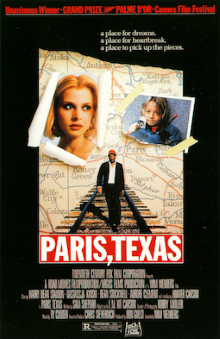
We’ve watched a few films by director Wim Wenders but this one is arguably his most celebrated work so it’s about time we got around to it. This film has a loudly American, specifically Texan, look with its shots of the desert landscapes, rolling highways and dusty towns but its essence feels very European. Indeed it was by French and German companies and apparently Wenders has an entire series of road trip films made in this manner.
A man, later identified as Travis Henderson, walks out of the desert and collapses in the small town in Texas. The local doctor manages who contact his brother Walt in California who comes to fetch him, noting that Travis has been missing for the past four years. Uncommunicative and still in a fugue state, Travis seems to only want to go back to walking aimlessly and Walt has to patiently cajole him to get him back home. Travis either can’t or won’t say what happened to him. But Walt explains that Hunter, Travis’ son with his wife Jane who is also missing, has been living with Walt and his own wife. Hunter is initially distant with Travis when they return but as Travis heals and comes to terms with his past, the little boy gradually opens up to him.
There’s a bit of tonal confusion in here as the mystery the film opens with with its absurdity and strangeness seems to presage a different sort of movie entirely, as my wife notes, perhaps something more allegorical and fantastical. It eventually resolves into a personal sort of drama, which while being very intense and original, feels a bit mundane given the previous setup. On every level however, this is a impressive piece of craftsmanship with the cinematography, music, and performances all elevating an ordinary story into the realm of greatness. The final scene in which Travis finally recounts what had happened to him is a case in point. As it is entirely driven by dialogue it breaks the cardinal rule that cinema should be about showing and not telling, yet such is the quality of Travis’ delivery and how Wenders sets everything up perfectly to flow into this payoff, it makes for a powerful, cathartic finale.
It’s hard to pin down what exactly makes this film so good as its qualities sometimes seem as ineffable as the object of Travis’ wanderings. One might be the incredible wealth of detail that goes into building each character up to and including their childhood experiences which shaped them. Nastassja Kinski who played Jane apparently wrote an entire diary developing her character’s backstory. Another might be how it uses the Texan landscape and the metaphor of travel to perfectly evoke a powerful sense of loneliness and isolation that touches something deep inside the psyche of the audience. It’s notable for example that the ending scene amounts to two people each talking into the darkness. Whatever the reasons this is a true masterpiece that is better than it should have any right to me given its simplicity. It’s a great example of how far you can get with pure craft alone.